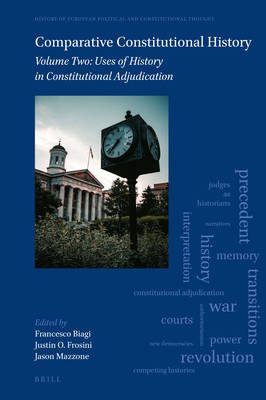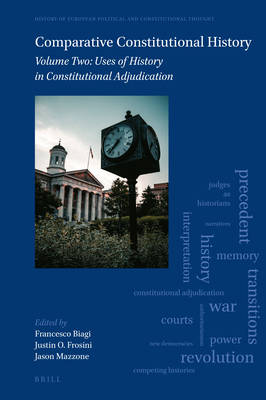
- Afhalen na 1 uur in een winkel met voorraad
- Gratis thuislevering in België vanaf € 30
- Ruim aanbod met 7 miljoen producten
- Afhalen na 1 uur in een winkel met voorraad
- Gratis thuislevering in België vanaf € 30
- Ruim aanbod met 7 miljoen producten
Comparative Constitutional History
Volume Two: Uses of History in Constitutional Adjudication
€ 210,95
+ 421 punten
Omschrijving
Constitutions are a product of history, but what is the role of history in interpreting and applying constitutional provisions? This volume addresses that question from a comparative perspective, examining different uses of history by courts in determining constitutional meaning. The book shows that there is considerable debate around the role of history in constitutional adjudication. Are, for example, historical public debates over the adoption of a constitution relevant to reading its provisions today? If a constitution represents a break from a prior repressive regime, should courts construe the constitution's provisions in light of that background? Are former constitutions relevant to interpreting a new constitution? Through an assessment of current practices the volume offers some lessons for the future practices of courts as they adjudicate constitutional cases.
Contributors are: Mark D. Rosen, Jorge M. Farinacci-Fernós, Justin Collings, Jean-Christophe Bédard-Rubin, Cem Tecimer, Ángel Aday Jiménez Alemán, Ana Beatriz Robalinho, Keigo Obayashi, Zoltán Szente, Shih-An Wang, and Diego Werneck Arguelhes.
Contributors are: Mark D. Rosen, Jorge M. Farinacci-Fernós, Justin Collings, Jean-Christophe Bédard-Rubin, Cem Tecimer, Ángel Aday Jiménez Alemán, Ana Beatriz Robalinho, Keigo Obayashi, Zoltán Szente, Shih-An Wang, and Diego Werneck Arguelhes.
Specificaties
Betrokkenen
- Uitgeverij:
Inhoud
- Aantal bladzijden:
- 392
- Taal:
- Engels
- Reeks:
- Reeksnummer:
- nr. 10
Eigenschappen
- Productcode (EAN):
- 9789004437050
- Verschijningsdatum:
- 8/12/2022
- Uitvoering:
- Hardcover
- Formaat:
- Genaaid
- Afmetingen:
- 155 mm x 235 mm
- Gewicht:
- 723 g

Alleen bij Standaard Boekhandel
+ 421 punten op je klantenkaart van Standaard Boekhandel
Beoordelingen
We publiceren alleen reviews die voldoen aan de voorwaarden voor reviews. Bekijk onze voorwaarden voor reviews.









